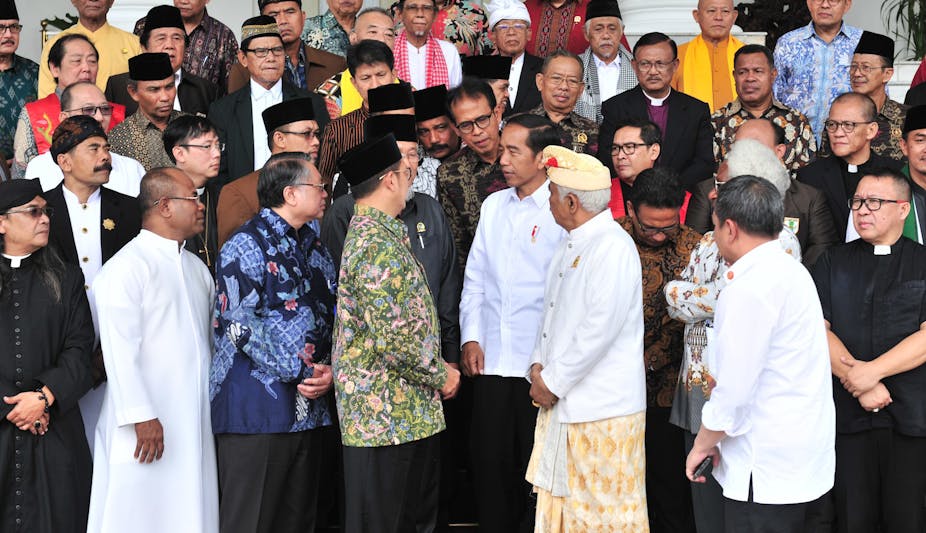The hashtag #KamiTidakTakut (“we are not afraid”) became popular on social media after a terrorist attack, involving multiple explosions and gunfire on Jalan Thamrin in Jakarta’s downtown area, in January 2016.
The aim of the hashtag was to show fearlessness and counter the attackers’ attempts to spread terror among Indonesians. People posted selfies of themselves at the scene of the attack, which became an attraction complete with food stalls.
Living in a country located in the Ring of Fire, Indonesians are also familiar with various natural disasters: earthquakes, tsunamis and volcanic eruptions. In contrast to their response to terrorist attacks, natural disasters usually arouse vigilance among communities.
Unfortunately, the public narrative around the COVID-19 pandemic tends to replicate the sentiments of #KamiTidakTakut, instead of those towards natural disasters.
Until March, many Indonesians still attended public gatherings such as weddings and religious ceremonies.
This may be because the COVID-19 pandemic is still largely a mysterious disaster, unlike terrorist attacks which have been studied for much longer and addressed with calculated measures.
The Indonesian public’s misunderstanding is in part a result of the government’s ineffective communication.
As a religious nation, Indonesia could rely on its religious leaders to be more involved in communicating messages to the public about the crisis.
Read more: Banning niqab makes no sense in Indonesia, but wearing it does
The role of religious institutions
In Indonesia, religious leaders have considerable potential in influencing the public narrative.
Indonesians are strongly religious, especially when it comes to political preference.
Data from the Pew Research Center in 2018 showed 83% of Indonesians think religion plays a more significant role now compared to 20 years ago.
Religious leaders also have a critical role in increasing public awareness of local health issues.
Local religious leaders’ role in Indonesia, for instance, proved to be critical in the rubella vaccination program between 2017 and 2018. Religious authorities, organisations and national leaders helped to promote the vaccine as many Muslims questioned whether the vaccines were halal.
One of the challenges in increasing public awareness of COVID-19 in Indonesia is the perception it is a foreign disease and is far away from the local context.
Messages on staying at home, social distancing, self-isolation and self-hygiene will be easier to grasp by people at a grass-roots level if delivered by religious leaders.
Religious activities also often involve mass gatherings. Religious leaders’ decision to adapt rituals to the current pandemic will be critical in minimising the spread of COVID-19.
In Italy, Pope Francis has decided to hold the Easter liturgies in the Vatican without public attendance. In Saudi Arabia, Al Haram Mosque – one of the holiest sites in Islam– has been closed.
In the UK, all religious activities have been suspended since mid-March.
In Indonesia, the Indonesian Ulema Council (MUI) has released an edict calling on Muslims to pray at home and avoid congregating in areas where COVID-19 had spread. Leaders of local mosques, however, still defy this call.
The Jakarta Archdiocese has ordered the suspension of most on-site church services in the city from March 20 to April 2. The weekly and daily services will instead be offered via live-stream.
The Hindu organisation Parisada Hindu Dharma Indonesia has also published a guidance of funeral and death rites during the pandemic.
Read more: How the daily lives of Indonesian youth can tell us why they become more conservative
Pandemic preach
As of March 31, as many as 1,528 people tested positive for COVID-19 in Indonesia. This is double the number of people five days before – with a total death of 136.
Researchers have predicted that at the end of April, there could be up to 71,000 infected people in Indonesia. The government also estimates between 600,000 and 700,000 Indonesian are at risk of infection.
The government has failed to build a vigilant narrative. Until February, government officials still promoted the image of Indonesia as a virus-free country.
At the same time, the government’s economic priorities, and lack of coordination and transparency with regional governments, have created a murky public narrative on the epidemic.
Indonesian media and communication systems are also unreliable. National television has no well-structured public agenda, while social media is rife with misinformation.
Amid the pandemic, health and safety of the masses should be a priority.
Religious leaders should be at the forefront in guiding the public and relying on scientific evidence about the virus.
Social media penetration is increasing, so religious leaders should increase their presence on social media.
The Indonesian health system, communication system, and leadership at the national level might be wanting, but a religious narrative emphasising the balance of hope and vigilance is vital in countering the misguided ideas of the crisis.


